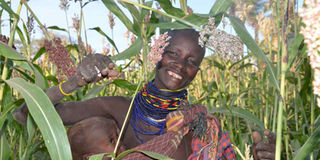Irrigation projects fail to end perennial hunger in Turkana

Pauline Akiru, 35, with her baby at the Naoyawai Irrigation Scheme's farm in Turkana County. Residents in the region farm sorghum under irrigation. PHOTO | FAITH NYAMAI | NATION MEDIA GROUP
What you need to know:
· Hunger still ravages the region every year despite the many projects being implemented by the National Irrigation Board.
· The irrigation projects are spread across the vast Turkana, with at least two in each of the county’s five constituencies.
· Unlike similar projects in other parts of the country, the ones in Turkana rely solely on rainfall.
The fanfare that greeted the launch of dozens of projects aimed at ending perennial hunger in Turkana County years ago has evaporated after many turned into white elephants.
This is despite the government pumping hundreds of millions of shillings into the schemes.
The irrigation projects are spread across the vast Turkana, with at least two in each of the county’s five constituencies.
29,100 ACRES
Hunger still ravages the region every year despite the many projects being implemented by the National Irrigation Board.
Loima has Nadapal, Nakamane, Kabolukor, Kalemunyang Phase I and II, Kolyoro and Loborot irrigation projects.
Nadoto, Elelea and Naoros projects are found in Turkana central while Turkana east has Lokubae and Morulem Phase I and II.
In the south is Katilu, Naremit and Nakwamoru.
The projects cover a total of 29,100 acres and were started for maize and millet production.
There are smaller irrigation projects initiated by the devolved government, which too have failed.
More than Sh1billion has been pumped into these projects.
In 2016, the Public Procurement Regulatory Authority put NIB on the spot for irregularly award of the tenders. The Authority accused the board of implementing projects that were flagged for their poor design and management.
USELESS SWATHES
According to the authority, the canals at Loborot Irrigation Scheme are poorly built and maintained. The scheme became unreliable just three years after being completed. The canals are blocked by silt.
Naoros in Turkana central was invaded by the Mathenge shrub, making it difficult for residents to produce any food crop.
Morulem Phase I and II are on a 3,300-acre piece of land.
It is a perfect representation of failed irrigation projects. There was not a single crop when the Nation team arrived at the scheme yesterday.
Locals said the last time they planted anything on plots given to them by the board was two years ago when rains fell.
Like the others in Turkana, this project relies on rainfall as opposed to irrigation schemes in many other counties that get their water from permanent rivers.
According to NIB, the plan was to get water from River Kerio but that has not materialised.
With no rainfall since April last year, the acres under the project have become useless swathes of land.
Mr Albert Ekai, 40 — one of the local farmers — said his last harvest was in June 2018.
RUSTLERS ATTACK
"Due to an invasion of locusts, I only harvested four sacks of maize down from the usual nine. I expected the rain to fall immediately I harvested and plant again but that was not to be," Mr Ekai said.
The villager added that he sold some of the maize to settle his children’s school fees.
Last week, his family was given five kilogrammes of maize, a kilogramme of beans and a half a litre of cooking oil by the government.
Mr Ekai added that cattle rustling, banditry and general insecurity are the other reasons contributing to poor harvests since farmers live in fear of attacks.
On Saturday, rustlers attacked herders on the slopes of Kolong hills and drove away hundreds of animals.
Next to the Irrigation Scheme is Nakwakunyuk village where a hungry Abalim Lomokol, who is in his 60s, was dozing under a tree.
His hopes to get relief food for his two wives and nine children.
"My family has gone without food for three days. I sold a goat for Sh1,000 and divided the cash equally to my wives to buy food but the money is finished," Lomokol said.




